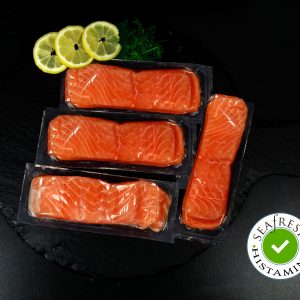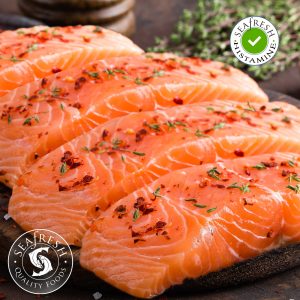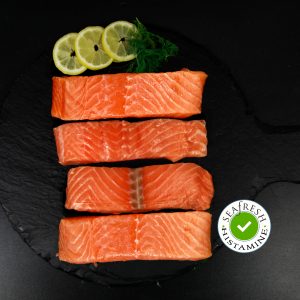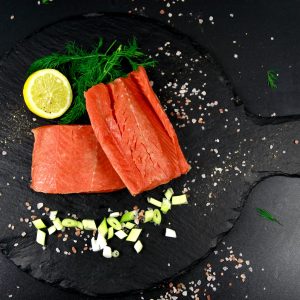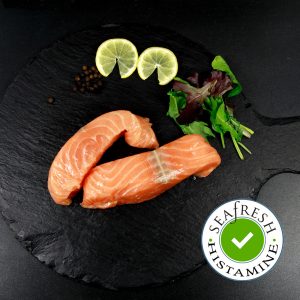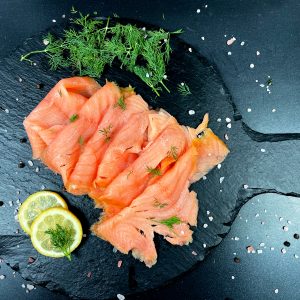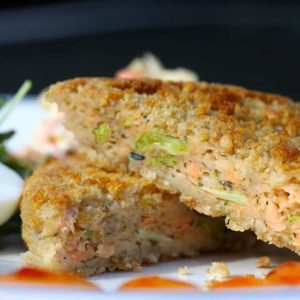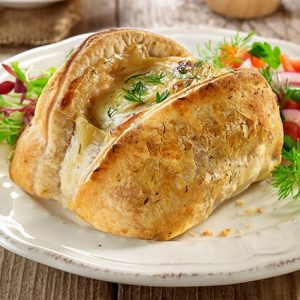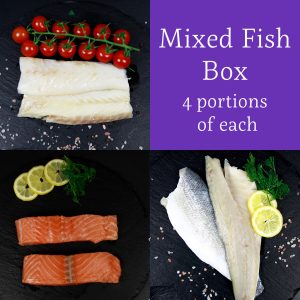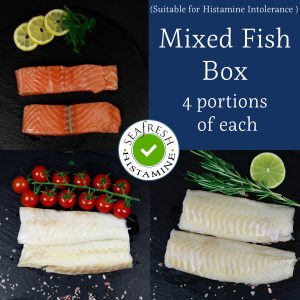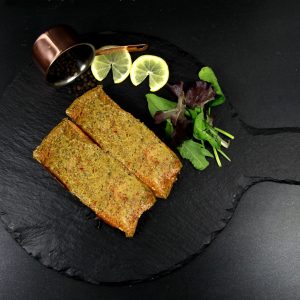Frozen Salmon
Salmon is such a popular frozen fish and for good reason, it’s healthy, filling, super tasty and very versatile. It has a thick, flaky texture, almost steak-like which fills you up more so than Plaice or Sole.
Its health benefits such as Omega 3 and protein are essential for a balanced diet and Salmon goes with so many things.
When buying frozen salmon fillets look for a good pink or red colour and for the thickness being the same the whole way through the fillet. If you get Salmon that is very thin at one end it will cook much quicker than the rest of the fish, it will burn and crisp leaving you with only half a fillet! So, go for CENTRE CUT fillets, these are taken from the centre of the fish, usually boneless and can be bought skinless or skin on.
Skinless fillets are great for oven baking or microwave cooking but if you prefer skin on Salmon it is best to have crispy skin and you achieve this by pan-frying. There are two main sources of Salmon, Wild Atlantic Salmon & Farmed Salmon, we always recommend farmed Salmon as the Marine Conservation Society has the Wild Atlantic Salmon on the Endangered (do not fish) list and farming Salmon is an excellent way to keep it sustainable, it is responsible sourcing at it’s best, especially as there is a growing demand for Salmon. Farmed, Centre Cut, Skinless & Boneless. You’re not a real fan of Salmon until you’ve tried Sockeye Salmon.
Showing all 11 results
Salmon Nutrition and Health Benefits
Is Salmon a healthy fish? YES – Salmon is healthy, not only is it high in Omega 3 Fish Oil (fatty acids) it has lots of vitamins too.
Whilst Salmon is still low in fat it has a little more fat than a similar size portions of white fish such as Cod or Haddock BUT it has Omega 3 to compensate which is essential for a healthy balanced diet. The fatty acids have been shown to have a positive effect on blood count levels, infant development and the immune system. In a typical portion of Salmon weighing 150grams you will find 3.2grams of Omega 3.
It is recommended to have Salmon for dinner once at least once a week to meet the body’s needs for Omega 3. Salmon also has Vitamin A, Calcium & Vitamin B12 along with Selenium and Iodine. Follow this link to see why these vitamins are essential for your body. So a typical 150gram (4-6oz) serving of Salmon contains:
Frozen Salmon
Calories 218
Fat 6.46g
Carbs 0g
Fibre 0g
Protein 37g
Sodium 112mg
Omega 3 3.2g
Calcium 2%RDA
Vitamin A 4%RDA
Vitamin B12 1.6%RDA
Frozen Salmon
Salmon recipes
Salmon FAQ’S
Farmed Salmon Vs Wild Salmon
Farming Salmon is the best way to keep it sustainable. Over the years Salmon farms have been given bad press and some rightly so. However, there ARE excellent Salmon Farms out there, they are farmed at sea in a natural environment, no harmful chemicals are used and cleanliness is paramount. These farms are superb and a necessity to keep Salmon sustainable. A reputable online fishmonger will know exactly where their Salmon comes from and should provide information about the farm on request. Wild Salmon is excellent when available, the MCS (Marine Conservation Society) has an excellent guide to what fish is good to be eating and what fish we should avoid ….because it’s endangered.
Frozen Vs Fresh
Unless you are catching Salmon yourself, the BEST way, without doubt, is to buy frozen Salmon from a reputable fishmonger. Salmon that is frozen within hours of being caught in the freshest way to have it. When you freeze Salmon or any kind of food it stops the deterioration process in its tracks, no bacteria can form, no histamine can form, nothing breaks down from this point on. So when you come to eat your Salmon you can guarantee it’s as fresh as can be! When purchasing fresh Salmon or any fresh fish it’s hard to know how fresh it actually is, it may have been a few days since catch before it even reaches your local shop/supplier. Of course, there are wonderful companies out there, local fishermen & the dockside fish markets that provide fresh Fish BUT the freshest will always be frozen at the source.
What sauces go well with Salmon?
When I think sauce for Salmon, my first thought is always Hollandaise Sauce, it goes so well with Salmon. The colour of Hollandaise is light yellow because of the amount of butter & egg yolks it has in it. The name Hollandaise sounds quite luxurious too so a great sauce for dinner parties and restaurant menus. Another common sauce for Salmon is Dill sauce, whereas Cod goes with Parsley Sauce, Salmon goes will Dill Sauce. These particular sauces are a White Sauce base with the addition of your chosen herbs. Of course, there is nothing stopping you using Parsley with Salmon if you don’t like Dill.
What’s the best way to cook Salmon?
When looking how best to cook Salmon firstly we look at the fillet… Is it skinless or skin on? The skin on is best to pan fry as this crisps up the skin perfectly. Skinless is best (or certainly for me, it’s easiest) to oven cook. When oven baking Salmon from frozen there is really is nothing to it, simply heat your oven to 180c, place the frozen Salmon Fillet into an ovenproof dish, add a little butter, leave uncovered and bake for 15-20 minutes. Done! By adding the little butter and cooking uncovered the Salmon will brown slightly. You can also cook frozen Salmon using a loose foil parcel (instead of the oven proof dish). If you add a little lemon juice and a dash of white wine the Salmon will steam and cook beautifully in the same amount of time. This method will keep the Salmon moist but won’t allow it to brown slightly…..So, the choice is yours and it really is down to personal choice with what you like and how you like your salmon fish.
Frozen Salmon
{
“@context”: “https://schema.org”,
“@type”: “FAQPage”,
“mainEntity”: [{
“@type”: “Question”,
“name”: “Farmed Vs Wild”,
“acceptedAnswer”: {
“@type”: “Answer”,
“text”: “Farming Salmon is the best way to keep it sustainable. Over the years Salmon farms have been given bad press and some rightly so. However, there ARE excellent Salmon Farms out there, they are farmed at sea in a natural environment, no harmful chemicals are used and cleanliness is paramount. These farms are superb and a necessity to keep Salmon sustainable. A reputable fishmonger will know exactly where their Salmon comes from and should provide information about the farm on request. Wild Salmon is excellent when available, the MCS (Marine Conservation Society) has an excellent guide to what fish is good to be eating and what fish we should avoid ….because it’s endangered.”
}
},{
“@type”: “Question”,
“name”: “Frozen Vs Fresh”,
“acceptedAnswer”: {
“@type”: “Answer”,
“text”: “Unless you are catching Salmon yourself, the BEST way without doubt is to buy frozen Salmon from a reputable fishmonger. Salmon that is frozen within ours of being caught is the freshest way to have it. When you freeze Salmon or any kind of food it stops the deterioration process in its tracks, no bacteria can form, no histamine can form, nothing breaks down from this point on. So when you come to eat your Salmon you can guarantee it’s as fresh as can be! When purchasing fresh Salmon or any fresh fish it’s hard to know how fresh it actually is, it may have been a few days since catch before it even reaches your local shop / supplier. Of course there are wonderful companies out there, local fishermen & the dockside fish markets that provide fresh Fish BUT the freshest will always be frozen at source.”
}
},{
“@type”: “Question”,
“name”: “What sauces go well with Salmon?”,
“acceptedAnswer”: {
“@type”: “Answer”,
“text”: “hen i think sauce for Salmon, my first thought is always Hollandaise Sauce, it goes so well with Salmon. The colour of Hollandaise is light yellow because of the amount of butter & egg yolks it has in it. The name Hollandaise sounds quite luxurious too so a great sauce for dinner parties and restaurant menu’s. Another common sauce for Salmon is Dill sauce, where as Cod goes with Parsley Sauce, Salmon goes will Dill Sauce. These particular sauces are a White Sauce base with the addition of your chosen herbs. Of course there is nothing stopping you using Parsley with Salmon if you don’t like Dill.”
}
},{
“@type”: “Question”,
“name”: “What’s the best way to cook Salmon?”,
“acceptedAnswer”: {
“@type”: “Answer”,
“text”: “When looking how best to cook Salmon firstly we look at the fillet…. Is it skinless or skin on? Skin on is best to pan fry as this crisps up the skin perfectly. Skinless is best (or certainly for me it’s easiest) to oven cook. When oven baking Salmon from frozen there is really is nothing to it, simply heat your oven to 180c, place the frozen Salmon Fillets into an oven proof dish, add a little butter, leave uncovered and bake for 15-20 minutes. Done! By adding the little butter and cooking uncovered the Salmon will brown slightly. You can also cook frozen Salmon using a lose foil parcel (instead of the oven proof dish). If you add a little lemon juice and a dash of white wine the Salmon will steam and cook beautifully in the same amount of time. This method will keep the Salmon moist but won’t allow it to brown slightly…..So, the the choice is yours and it really is down to personal choice with what you like and how you like it!”
}
}]
}

